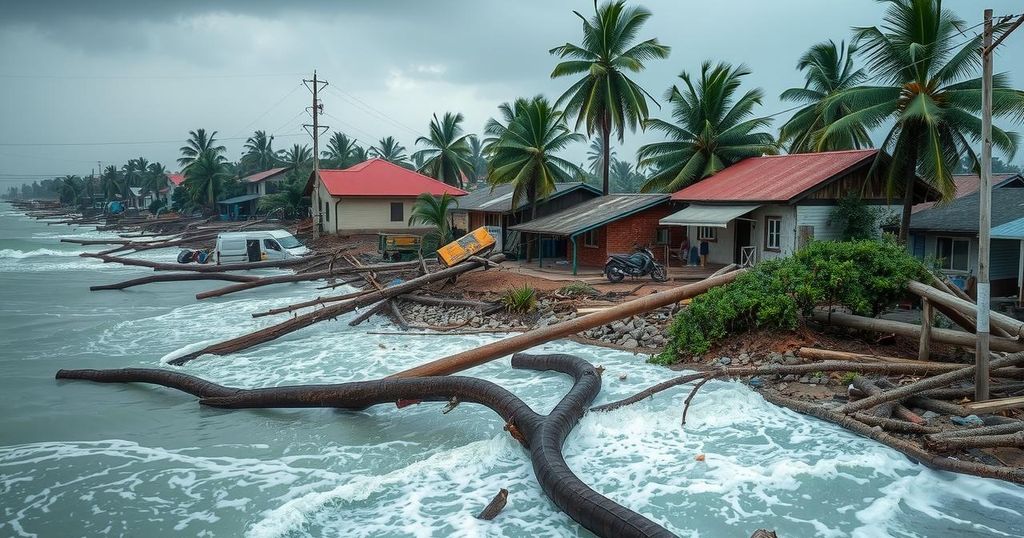Cyclone Chido struck Mozambique on December 15, resulting in 94 fatalities, 768 injuries, and affecting over 622,000 individuals. The cyclone caused significant damage to educational and healthcare facilities, especially in the northern provinces. As recovery efforts commence, the disaster highlights the region’s vulnerability to cyclones and the pressing need for resilient infrastructure in the face of climate change.
Cyclone Chido has tragically resulted in the deaths of 94 individuals since making landfall in Mozambique, according to local authorities. The National Institute of Risk and Disaster Management (INGD) reported that 768 individuals sustained injuries and over 622,000 were affected by the cyclone. This devastating event occurred on December 15, when Chido hit Mozambique with winds reaching 260 km/h (160 mph) and substantial rainfall of 250mm in the initial 24 hours.
Initially, Cyclone Chido caused significant destruction in the French Indian Ocean territory of Mayotte before advancing to Mozambique, Malawi, and Zimbabwe. In Mozambique, the storm primarily impacted the northern provinces, including Cabo Delgado, Niassa, and Nampula, which are frequently vulnerable to cyclonic activity. The INGD indicated severe repercussions on the educational and healthcare systems, with approximately 109,793 students impacted due to damage to school infrastructure. Additionally, 52 healthcare facilities were affected, resulting in a heightened risk to essential health services, particularly in areas already facing healthcare accessibility challenges.
Daniel Chapo, the leader of Mozambique’s ruling party, expressed the government’s commitment to mobilizing support at all levels in response to this natural disaster. During a visit to Cabo Delgado, one of the hardest-hit regions, Mr. Chapo assured that the government is collaborating with the INGD to assist affected individuals in Mecúfi, Nampula, Memba, and Niassa in their recovery efforts.
Cyclone Chido was particularly devastating in Mayotte, where it became the worst storm to impact the archipelago in 90 years, resulting in the confirmed deaths of 35 people. Authorities in Mayotte expect the death toll to rise as damage assessments continue, with early estimates suggesting that fatalities could extend into the hundreds or thousands. Over 1,300 officers have been deployed to support the local population, many of whom continue to face severe shortages of basic necessities.
The cyclone’s aftermath highlights the vulnerability of social infrastructure to climate change, emphasizing the urgent need for resilient planning to mitigate future impacts. While the influence of climate change on specific storms is complex, the Intergovernmental Panel on Climate Change (IPCC) has indicated a strong correlation between human actions and increased precipitation and intensity associated with tropical cyclones.
Cyclones represent some of the most destructive weather phenomena, characterized by high wind speeds, heavy rainfall, and storm surges, leading to extensive damage and flooding. With climate change leading to shifts in weather patterns, the intensity and frequency of cyclones are expected to increase, challenging the resilience of affected regions. Mozambique is particularly at risk due to its geographical location, being prone to the impacts of seasonal cyclones, necessitating comprehensive disaster management strategies. Cyclone Chido exemplifies the vulnerability of communities to these natural disasters, and the need for effective response mechanisms and infrastructure resilience is more critical than ever.
In summary, Cyclone Chido has devastatingly impacted Mozambique and Mayotte, resulting in significant loss of life and extensive damage to infrastructure. The government’s response efforts highlight a commitment to aid those affected, although the challenges remain immense, particularly in healthcare and education. The disaster underscores the broader implications of climate change on natural disasters, reinforcing the necessity for robust planning and infrastructure to safeguard vulnerable populations against future catastrophes. The need for increased awareness and preparedness in the face of such natural challenges cannot be overstated.
Original Source: www.bbc.com







